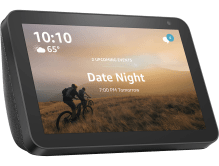Carlton Senior Living Headcount Reduction via Contextual Alexa
Speak2 is proud to share the case study below. Providing contextual context related to requests has been a goal in Senior Care for a long...
2 min read
Matt Smith
:
June 28, 2021

Let’s start with the fact that I am a tech nerd, and I love gadgets and new technology. So I get it, my perspective is a bit different. But like everyone else, I wonder why I see ads on Facebook for kayaks 5 minutes after I drove past a kayak store and said, “I’d like to go kayaking.” In all honesty, I know why I see that ad. I know how this works. The kayak store has a geolocation ad on Google, so when I drive by, my phone knows that. And, both Google and Facebook are listening to me on my smartphone. So that’s why I get the kayak ad. (P.S., I probably won’t go kayaking).
What has this got to do with Alexa? The number one thing people ask about Alexa is privacy. Because Alexa is a “listening” device, the concept is ingrained that it is “always listening.” In a sense, it is always listening, but what it is listening for is the important part. It is only listening for its “wake word.”
If you sit next to Alexa and speak for 10 hours, it is not “listening” to everything you say. The tech inside Alexa is built to react to the wake word – “Alexa” – and then it starts to listen and record your command so that it can do something. So if you say, “I secretly really love to watch Love Island, and I cry during the rose ceremony of the Bachelor,” Alexa is not listening and recording those completely NOT embarrassing facts about you. But if you say, “Alexa, who is the star of the Bachelor?” it will wake up, listen to your question, search the internet and give you an answer. And more than likely, there is a tiny computer somewhere that makes a note of the fact that you like the Bachelor, and then they sell that information to anyone who wants it.

There is a critical detail to all of this. Alexa is not listening to everything you say. There are 100 million Amazon Echo devices around the world and growing. They are not listening 24/7 and recording every conversation in every room in every corner of the world. If you don’t believe me, you can ask Amazon – and if you think they would lie about it, you can read about Alexa and privacy here: Is Alexa Always Listening? And if you don’t trust that either, then stop reading because you aren’t going to be convinced.
When I visit a healthcare facility – a hospital, assisted living, etc. – I see everyone walking around with a cell phone. We discuss Alexa and they say, “What about HIPAA? What about privacy?” Some people don’t like the idea of it – “That thing talks to me when I don’t want it to!”
Alexa presents a new mode of thinking, and because of the way it works, it worries people. And in some cases, it should. I am not suggesting that everyone drop an Alexa into every hospital room. But just like a cell phone, Alexa provides tremendous benefits. It lessens isolation, connects people, opens up technology to people with visual or tactile challenges, and more. When used correctly, with the proper amount of care and security measures, it is safe, or even more safe, than the cell phone that wants to sell me a kayak.
Speak2 is proud to share the case study below. Providing contextual context related to requests has been a goal in Senior Care for a long...
The Basics “Alexa, play Taylor Swift.” That is the most common phrase, I imagine, that Alexa hears. Because everyone loves Taylor, even if...
Speak2 At Leading Age We recently had the opportunity to be a part of LeadingAge Florida’s 58th Annual Convention and Exposition! At the...